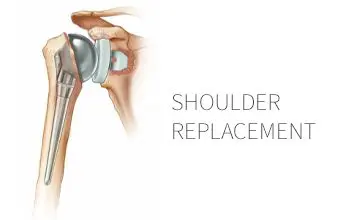Welcome to our latest blog installment featuring Dr. Timothy Pater, an esteemed specialist at Orthopaedic & Spine Center of the Rockies. With a focus on Hand & Upper Extremity Surgery and expertise in Shoulder Replacement Surgery, Dr. Pater brings a wealth of knowledge and experience to the field. In this FAQ session, he addresses common queries related to shoulder replacement, shedding light on the intricacies of the procedure, its benefits, and what patients can expect on their journey to improved shoulder health.
FAQs About Shoulder Replacement Surgery
Answered by Dr. Timothy Pater, MD
What is the major cause of shoulder pain? Arthritis. Arthritis is the result of the cartilage in a joint being worn out over time. I often describe arthritis in the shoulder as having a “rusty hinge”. The cartilage in your joint is supposed to be a smooth surface that allows things to move easily; however, when the cartilage wears out as a result of arthritis it becomes a rough surface, or “rusty”. How do I know when I’m ready for shoulder replacement surgery? If you have pain in your shoulder, limited function, and difficulty sleeping it is important to try arthritis medications and cortisone injections. If the medication and injections do not relieve your shoulder pain then it is time to discuss a shoulder replacement. How old are your shoulder replacement patients? The typical age group for a shoulder replacement patient is 60-80 years old. I have performed shoulder replacements on patients as old as 88 and as young as the mid-40s. Every patient’s situation is uniquely different and I consider that when discussing a shoulder replacement. How should I prepare for my shoulder replacement surgery? For the most part, it is not valuable to do therapy or exercise before a shoulder replacement surgery. Unfortunately, the movement further aggravates the shoulder and causes more pain. My preparation advice for shoulder replacement surgery is more focused on the practical things in life… you have to prepare for the fact that you aren’t going to have use of your arm for a matter of weeks, which means you might need some help at home (cooking, showering, driving, etc.). I don’t recommend you drive for at least a couple of weeks following surgery. Patients need to plan and understand what the nuts/bolts are regarding their recovery. Should I add or subtract any foods from my diet? Certain foods, more related to nutritional supplements, can cause your blood to be thinned, a similar effect as aspirin or blood thinners. I will go over a list of supplements that could have this effect…I will have you stop taking those items a week before your shoulder replacement surgery. When should I expect to feel relief from my shoulder pain after my shoulder replacement? There is some immediate change regarding the movement of the shoulder being much smoother; however, for a few weeks after surgery, it is more painful than before surgery. At about two weeks post-surgery people start to get over the “hump” and it is less painful than before surgery. The pain will continue to gradually decrease. At two months the average patient is very happy they had their shoulder replaced. What kind of medications do you usually prescribe following a shoulder replacement? Most people require, to some degree, oxycodone or hydrocodone. In addition, I supplement anti-inflammatory medications. Each patient is very unique and their pain levels vary, naturally, I make those adjustments accordingly. What should I expect to be the hardest part of my recovery following my shoulder replacement? In the first couple of days, the pain will be significant, but it can also be controlled with the appropriate medications. Regaining range of motion takes time, patience, and persistence… it only improves at a certain rate each month. Will I have to stay in the hospital after my shoulder replacement surgery? Yes. The typical stay is somewhere between 24-48 hours: 50% stay one day while 50% stay two days. Rarely do patients stay longer than two days. Will you prescribe physical therapy? How long will therapy last? Yes, I will prescribe physical therapy. Typically, therapy will last two months following the operation; however, sometimes patients require more. Is it very often that patients need both shoulders replaced? Most people who develop arthritis on one side develop it on the other side as well. Most often one side hurts worse than the other and so many patients opt for both shoulders to be replaced but it is usually a couple of years between the two operations. What brand of replacement do you prefer to use? I prefer the Global AP Shoulder by Depuy. I think there are several good replacement equipment options; however, Depuy is what I have the most experience with. What is the replacement made of? The replacement is made of titanium, stainless steel, and high-density plastic in the socket. I have an example of the replacement I can show you when you come for an office visit. How long will my shoulder replacement last? The estimate is around 15 years, but that estimate is variable and we see them last longer in some patients. It is difficult to predict how long each patient’s shoulder replacement will last, specifically because the materials we use now are improved from those 7-8 years ago. Typically if you need a shoulder redone, you redo the whole thing (not just parts), but we rarely have to do that. For most people, their shoulder will last for as long as they need it; however, that depends on the age that the patient who received their replacement What are possible complications with a total shoulder replacement?
- Infection is always the number one concern. We take a lot of precautions to prevent an infection when it comes to the surgery technique and antibiotics (you get antibiotics around the time of surgery).
- There is a possibility I can injure a very important nerve in the shoulder that is close to where I am working. If that nerve is injured it can have an impact on your ability to raise your arm above your head. I am very mindful of that nerve during the surgery.
- From a practical standpoint, wear and tear of the parts over time can cause complications.
When can I return to work after my shoulder replacement? Construction worker: 3 months Desk worker: 2 weeks How many shoulder replacements do you perform in a year? About 40 I’ve heard there is a shoulder replacement that you put in backward… why backward? It is called a Reverse Ball and Socket Shoulder Replacement. It is not better than a standard shoulder replacement, it is just necessary in certain circumstances. The circumstances we use it in are when you have had a very complicated fracture or when your rotator cuff is non-functional. Do I need to take an allergy test? No. In my experience, I have never seen allergies to the metal in any of my patients. What kind of medical equipment will I need? Typically you go home from the hospital with a sling. Is there anything else I should pre-plan for? Almost everyone has a thorough physical exam with their primary care physician to make sure they are healthy enough to handle the stress of replacement surgery. In addition, the biggest thing to plan for is to have help at home. We also don’t recommend you drive for at least a couple of weeks following surgery. Don’t let shoulder discomfort limit your lifestyle; request an appointment with Dr. Timothy Pater today at OCR’s Longmont or Lafayette location.
Timothy Pater, MD
Dr. Pater joined Front Range Orthopedics & Spine in 2005 (now Orthopaedic & Spine Center Of The Rockies) after completing a fellowship in Hand and Upper Extremity Surgery at the Cleveland Clinic Foundation in Cleveland, Ohio. He has received extensive training in reconstructive and arthroscopic techniques for the treatment of problems of hand, wrist, elbow, and shoulder. He earned his Bachelor of Science degree from Marquette University and his medical degree at the University of Kansas School of Medicine. He completed his residency training in the Department of Orthopedic Surgery at the Medical College of Wisconsin. Learn more about Dr. Pater here.


